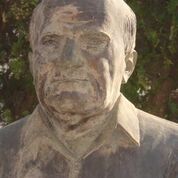Difference between revisions of "Ġużeppi Camilleri l-Jimmy tal-Fjur"
| Line 4: | Line 4: | ||
Aged eighteen, Camilleri enlisted with the Royal Malta Artillery, his private number being 4191. In the Second World War (1939-1946) he was a sergeant stationed allover Malta, including Bengħisa and St. Elmo in Valletta. His son Emanuel recalls him narrating how he was one of the soldiers manning the Maltese Bofors coastal guns on that ill-fated Italian e-boat attack on Malta. | Aged eighteen, Camilleri enlisted with the Royal Malta Artillery, his private number being 4191. In the Second World War (1939-1946) he was a sergeant stationed allover Malta, including Bengħisa and St. Elmo in Valletta. His son Emanuel recalls him narrating how he was one of the soldiers manning the Maltese Bofors coastal guns on that ill-fated Italian e-boat attack on Malta. | ||
Ġużeppi married Pawla Camilleri Ta' Ċaċu, also from Luqa. To avoid the devastation brought on this village, subject to enemy bombardment being close to the major airfield of RAF Luqa, the young couple moved to Birżebbuġa, a favoured seaside locality in south-eastern Malta, given that there was a direct bus link. The marriage bore five children: Ninu, Leli, Joe, Ġorġina and Marija, who passed away at birth. | |||
The war struck an impressive imprint on Camilleri, and in 1957 while living in Birżebbuġa, he penned the ballad entitled ''Id-Diżgrazzja tax-Xelter'', but better known by enthusiasts as ''Il-Fatt ta' Ħal Luqa''. Another ballad folksinger, [[Ċikku Degiorgio Tal-Fjuri]] sought permission to sing this ballad, on another vocal key. | The war struck an impressive imprint on Camilleri, and in 1957 while living in Birżebbuġa, he penned the ballad entitled ''Id-Diżgrazzja tax-Xelter'', but better known by enthusiasts as ''Il-Fatt ta' Ħal Luqa''. Another ballad folksinger, [[Ċikku Degiorgio Tal-Fjuri]] sought permission to sing this ballad, on another vocal key. | ||
In 1960, after twenty-seven years as a sergeant, Ġuzeppi emigrated to London, where he worked with the Royal Mail. The following year he returned to Malta, with the thought of emigrating to Canada. These plans were disrupted by the Cuban Missile Crisis, and instead the family sought new pastures in the southern hemisphere. | |||
In September 1962 Ġużeppi emigrated to Australia on the Italian liner M.V. Fairsea. His son Leli recalls the commotion his arrival brought with the substantial Maltese community in Melbourne, excited that such a noted folksinger had arrived amongst them. Swarms greeted him on the Melbourne wharf. A few months later the rest of his family joined him. | In September 1962 Ġużeppi emigrated to Australia on the Italian liner M.V. Fairsea. His son Leli recalls the commotion his arrival brought with the substantial Maltese community in Melbourne, excited that such a noted folksinger had arrived amongst them. Swarms greeted him on the Melbourne wharf. A few months later the rest of his family joined him. | ||
Revision as of 12:19, 7 August 2016
This page is a stub
Stub pages are like acorns. The first seed has been planted, but you can help them grow! There may, for example, also be other M3P resources linking to it. You can help by expanding this page.
Ġużeppi Camilleri l-Jimmy tal-Fjur was born in Qormi on the 21st January 1917, the son of Pawlu Camilleri Tal-Fjur and Antonietta nee Bartolo. The origins of the family nickname are unknown. He grew up with his maternal grandfather in the Wied il-Knejjes area of Luqa. His first encounters with folk music were true someone nicknamed as Il-Jimmy, who used to take the young with him to events. His father Pawlu was a ganger, a foreman who overlooked a gang of coal heavers at Marsa harbour. The young Ġużeppi started as a water boy providing for the thirsty labourers, and also tending his father's potato and onion fields close to Ir-Rixtellu in Luqa.
Aged eighteen, Camilleri enlisted with the Royal Malta Artillery, his private number being 4191. In the Second World War (1939-1946) he was a sergeant stationed allover Malta, including Bengħisa and St. Elmo in Valletta. His son Emanuel recalls him narrating how he was one of the soldiers manning the Maltese Bofors coastal guns on that ill-fated Italian e-boat attack on Malta.
Ġużeppi married Pawla Camilleri Ta' Ċaċu, also from Luqa. To avoid the devastation brought on this village, subject to enemy bombardment being close to the major airfield of RAF Luqa, the young couple moved to Birżebbuġa, a favoured seaside locality in south-eastern Malta, given that there was a direct bus link. The marriage bore five children: Ninu, Leli, Joe, Ġorġina and Marija, who passed away at birth.
The war struck an impressive imprint on Camilleri, and in 1957 while living in Birżebbuġa, he penned the ballad entitled Id-Diżgrazzja tax-Xelter, but better known by enthusiasts as Il-Fatt ta' Ħal Luqa. Another ballad folksinger, Ċikku Degiorgio Tal-Fjuri sought permission to sing this ballad, on another vocal key.
In 1960, after twenty-seven years as a sergeant, Ġuzeppi emigrated to London, where he worked with the Royal Mail. The following year he returned to Malta, with the thought of emigrating to Canada. These plans were disrupted by the Cuban Missile Crisis, and instead the family sought new pastures in the southern hemisphere.
In September 1962 Ġużeppi emigrated to Australia on the Italian liner M.V. Fairsea. His son Leli recalls the commotion his arrival brought with the substantial Maltese community in Melbourne, excited that such a noted folksinger had arrived amongst them. Swarms greeted him on the Melbourne wharf. A few months later the rest of his family joined him.
